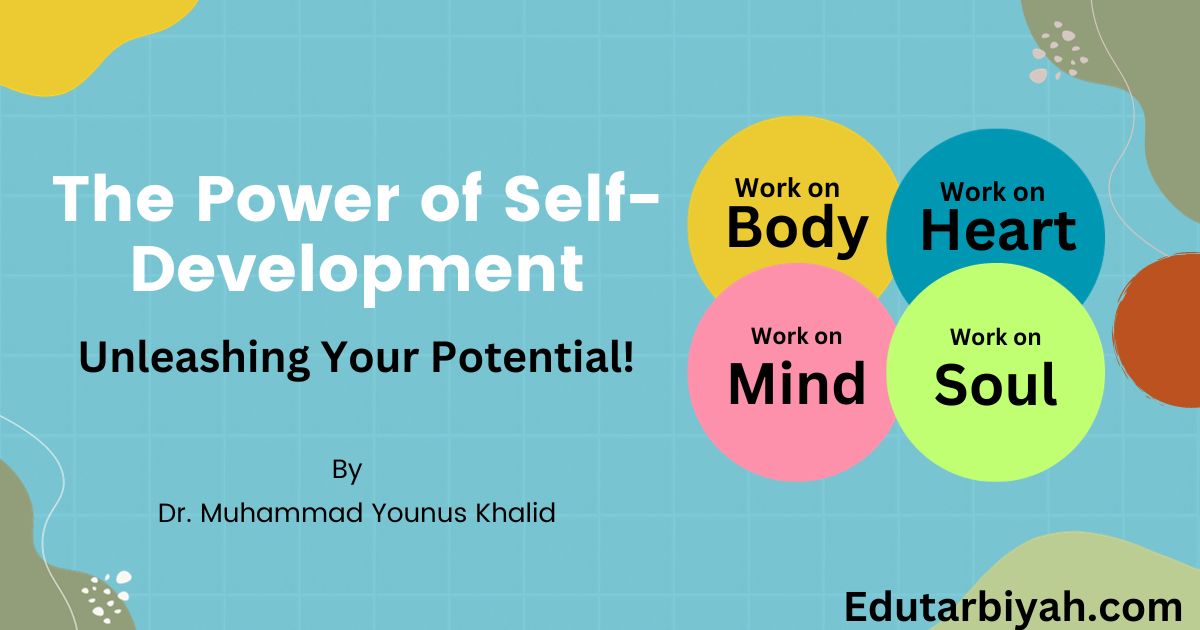The Power of Self-Development

By: Dr. Muhammad Younus Khalid
In the grand tapestry of life, each of us possesses the remarkable ability to shape our destinies and achieve our dreams.
However, this journey is not merely a passive process; it requires deliberate efforts to unlock our fullest potential. That’s where the magic of self-development comes into play.
It’s the transformative journey of self-improvement, personal growth, and the realization of our capabilities. In this exploration, we will delve into the profound significance of self-development, understanding that it is not just an option but an essential path to a more fulfilling and successful life.
In this article, we will embark on a journey to unveil the true essence of self-development, its myriad facets, and its unparalleled impact on our lives.
Self-development is not a one-size-fits-all concept; it is as unique as each individual who pursues it. By enhancing our understanding of what self-development entails and its diverse applications, we can harness its power to create a brighter future.
What is self-develop?
Self-development, also known as personal development or self-improvement or self-help, refers to the conscious and purposeful effort to enhance and refine one’s skills, knowledge, character, and overall well-being.
It is the process of learning new things and building new skills—skills that help us increase our chances of success, achieving our goals, and manifesting our dreams.
In other words, self-development is a process or work on one’s body, mind, heart, soul and overall wellbeing.
It involves a continuous process of learning, growth, and self-awareness with the aim of maximizing one’s potential and becoming the best version of oneself.
The history of self-development
The history of self-development is a diverse and evolving narrative that spans centuries. Here’s a brief overview of the key milestones and developments in the history of self-development:
-
Ancient Philosophical Traditions:
The roots of self-development can be traced back to ancient philosophical traditions, with notable contributions from Greek philosophers such as Socrates, Plato, and Aristotle. They explored ideas related to ethics, self-knowledge, and personal improvement.
-
Religious and Spiritual Traditions:
Many religious and spiritual traditions, including Judaism, Christianity, Islam, Buddhism, Hinduism etc. have long emphasized self-improvement, inner growth, and ethical development as essential aspects of a fulfilling life.
-
The Enlightenment (17th-18th Century):
The Enlightenment era marked a period of intellectual and philosophical exploration, where thinkers like René Descartes and John Locke laid the groundwork for modern ideas about individualism, reason, and self-determination.
-
Transcendentalism (19th Century):
The transcendentalist movement in the United States, led by figures like Ralph Waldo Emerson and Henry David Thoreau, promoted self-reliance, individualism, and a deep connection to nature as a path to personal development.
-
The Rise of Psychology (Late 19th Century):
The late 19th century saw the emergence of modern psychology, with pioneers like William James and Sigmund Freud delving into the workings of the human mind and behavior, contributing to the understanding of personal growth and self-awareness.
-
The Self-Help Movement (20th Century):
The self-help movement gained momentum in the 20th century, with influential figures like Napoleon Hill (“Think and Grow Rich”) and Dale Carnegie (“How to Win Friends and Influence People”) offering practical advice for personal success and development.
-
Humanistic Psychology (20th Century):
Humanistic psychology, represented by Abraham Maslow and Carl Rogers, emphasized self-actualization, personal growth, and the importance of self-awareness and self-fulfillment.
-
New Age and Self-Help Literature (Late 20th Century):
This era saw a proliferation of self-help books and movements, including the New Age movement, focusing on holistic well-being, spirituality, and personal transformation.
-
Digital Age and Online Resources (Late 20th Century-Present):
The advent of the internet has made self-development information and resources more accessible than ever. Blogs, podcasts, videos, and online courses have expanded the reach of self-help and personal development content.
-
Contemporary Trends (21st Century):
The self-development landscape continues to evolve, with a growing emphasis on mindfulness, resilience, emotional intelligence, and adaptability in the face of rapid societal and technological changes.
The history of self-development is a rich tapestry of philosophical, psychological, and cultural influences that have shaped our understanding of personal growth and well-being. It reflects the enduring human desire to strive for self-improvement and a more meaningful life.
Why self-development is so important?
Enhancing your personal growth stands as a crucial pursuit, empowering you to be better prepared to pursue your aspirations and ambitions. Furthermore, it equips you with the skills to seize command of your life and shape the destiny you desire.
Self-development, also known as personal development, is the process of improving and growing as an individual in various aspects of your life. It is important for several reasons:
-
Increased Self-Awareness:
Self-development helps you understand yourself better. You become more aware of your strengths, weaknesses, values, and beliefs. This awareness can lead to better decision-making and a clearer sense of purpose.
-
Skill Enhancement:
Developing new skills and improving existing ones can make you more competent in your personal and professional life. Whether it’s communication, time management, or technical skills, self-development can help you become more effective and adaptable.
-
Boosted Confidence:
As you achieve your self-improvement goals, your confidence and self-esteem grow. This increased confidence can positively impact your relationships, career, and overall well-being.
-
Adaptability:
The world is constantly changing, and self-development equips you with the ability to adapt to new circumstances and challenges. Learning to embrace change and be flexible is a crucial life skill.
-
Goal Achievement:
Setting and working towards personal and professional goals is a key aspect of self-development. It helps you stay motivated and focused on what’s important to you.
-
Better Relationships:
Improved communication and emotional intelligence gained through self-development can lead to more harmonious and fulfilling relationships with others.
-
Health and Well-being:
Self-development often involves adopting healthier habits and lifestyles, which can lead to improved physical and mental well-being. This, in turn, can increase your overall quality of life.
-
Career Advancement:
In the professional sphere, self-development can enhance your skills, knowledge, and leadership abilities. This can open up new opportunities and increase your chances of career advancement.
-
Lifelong Learning:
Self-development encourages a mindset of continuous learning. In a rapidly changing world, the ability to learn and adapt is invaluable.
-
Happiness and Fulfillment:
Ultimately, self-development can lead to a greater sense of happiness and fulfillment. By working on yourself and pursuing your passions and interests, you can lead a more meaningful life.
In simple terms, self-development is like investing in yourself. It helps you become a better, more capable, and happier person. Just as we maintain our physical health through exercise and a balanced diet, self-development is a way to ensure our mental and emotional well-being, helping us navigate life’s challenges and opportunities more effectively.
Self-Development in Islamic perspective
Self-development is a universal concept, sought after by people from all walks of life, driven by the desire to become better individuals. In the realm of Islamic teachings, self-development is not only encouraged but deeply rooted in the faith. Islam provides a comprehensive framework for individuals to grow and improve themselves spiritually, morally, and emotionally.
This blog post delves into the concept of self-development in the context of Islamic teachings, highlighting its significance and offering practical guidance for personal growth.
Self-Development through Faith:
In Islam, self-development begins with a strong foundation of faith. Believing in the oneness of Allah (God) and understanding the purpose of life provides the motivation for self-improvement. A deep connection with one’s faith leads to moral consciousness, humility, and a sense of purpose, which are crucial elements of self-development.
Self-Reflection and Self-Accountability:
Islam encourages regular self-reflection and self-accountability. Muslims are urged to evaluate their actions, intentions, and character. This introspection helps identify shortcomings and areas that require improvement, fostering personal growth.
Seeking Knowledge:
The pursuit of knowledge is highly regarded in Islamic teachings. The Prophet Muhammad (peace be upon him) emphasized the importance of seeking knowledge, stating that it is a duty for every Muslim, male and female. Acquiring knowledge not only benefits individuals in this world but also contributes to spiritual growth.
Character Development:
Islamic teachings stress the importance of good character. Muslims are encouraged to exhibit virtues such as honesty, patience, kindness, and gratitude. The Quran and Hadith (sayings and actions of the Prophet) provide guidance on how to cultivate these qualities, which contribute to self-development and positively impact interactions with others.
Prayer and Spiritual Growth:
Prayer (Salat) is a fundamental pillar of Islam. Regular prayers connect individuals with their Creator, providing inner peace and strength. They serve as a means of spiritual development, reminding Muslims of their purpose in life and their reliance on Allah.
Charity and Selflessness:
Engaging in acts of charity (Zakat and Sadaqah) promotes selflessness and compassion. By giving to those in need, individuals develop empathy, humility, and a sense of responsibility toward society.
Patience and Perseverance:
Islam teaches the importance of patience (Sabr) in the face of adversity. This quality is essential for personal growth, as it enables individuals to endure challenges and develop resilience.
Seeking Forgiveness:
Recognizing one’s mistakes and seeking forgiveness is a vital aspect of self-development in Islam. Admitting wrongdoing and asking for Allah’s forgiveness is a means of purifying the soul and moving towards self-improvement.
Tying Intentions to Actions:
Islam emphasizes the significance of having sincere intentions in all endeavors. It teaches that actions are judged by intentions, and when intentions are aligned with pleasing Allah, personal development takes on a profound spiritual dimension.
Conclusion:
Self-development is a core concept in Islam, aligning with the faith’s principles and values. It involves not only personal growth but also a deeper connection with one’s Creator and a sense of responsibility towards fellow human beings. By incorporating the teachings and practices of Islam into their lives, individuals can embark on a journey of self-improvement that benefits not only themselves but also their communities and the world at large.
Self-development areas:
Self-development can encompass a wide range of activities, including:
- Self-awareness
- Meaningfulness in life
- Character building
- Health and Well-being
- Goal setting and envisioning
- Time Management and productivity
- Confidence building and self-esteem
- Emotional intelligence
- Stress Management and Resilience
- Mindset belief system and Attitude
- Learning and Skill Development
- Communication skills
- Building Relationships and Networking
- Leadership and team building
- Financial Literacy and Wealth Building
- Behavior Management
- Strategies and action planning
It is a holistic approach to self-improvement that can lead to greater satisfaction, success, and fulfillment in various aspects of life, such as career, relationships, and personal well-being.





